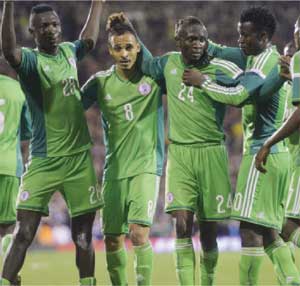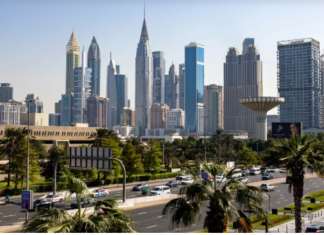•N500m invested by various brands
GODDIE OFOSE examines the investment of brands in the Nigerian national football team and the consequences of an early exit from the Mundial in Brazil.
Several brands have invested more than N500 million in the Super Eagles for the World Cup in Brazil as endorsement deals for Head Coach Stephen Keshi or the players or the team. Others target former internationals.
Some have also fly promotions to augment the chances of more value for investment.
Six brands with marketing programmes targeted at the Eagles’ coaching crew and players are Guinness, Peak Milk, TomTom, Globacom, Pepsi and STAR.
STAR signed on Kanu Nwankwo and Austin Okocha as brand ambassadors.
Sponsorship is one of several tools of a company’s marketing communications mix to accomplish business objectives. It is similar to other forms of promotion in the sense that it builds the brand. However, it also has distinct aspects.
Traditionally, marketing practitioners and academics alike maintain that the unique advantage of sponsorship is that fans/consumers perceive it as indirectly benefiting them as well, not just the sponsoring company, as is usually the case with the other forms of promotion.
Consumers’ view of sponsorship is linked to their understanding that sponsorship supports properties that are liked and supported by consumers. Such a favourable view is beneficial to companies because it implies that consumers will reciprocate by supporting companies that support the properties.
Marketing budgets and activities increase during major sporting events such as the World Cup, the Olympics, the African Cup of Nations and the Commonwealth Games. It is a period of intrigues among competitive brands.
In this World Cup, all the brands focus campaign on the Super Eagles’ long stay. The longer the team stays in the tournament the better for the brands and their investment.
Guinness’ investment in the Super Eagles during the African Cup of Nations in South Africa in February 2013 was close to catastrophe until the team stumbled to the final and won the trophy.
Supporters displayed apathy towards the Eagles at the Nations Cup, but Guinness emerged the biggest beneficiary as the brand stood by the team throughout.
No one expects the Eagles to win the World Cup in Brazil, at least 98 per cent of Nigerians do not think this is possible, unlike the case in South Africa.
The investment this time around, however, is on the basis that the national team will go as far as the semi final, which gives brands the opportunity to get good value for their money.
While TomTom (produced by Cadbury), Peak Milk, STAR and Pepsi backed their endorsement deals with consumer promotions, Guinness signed on brand ambassadors and also invested in the entire team.
Globacom drums up support for the Super Eagles nationwide with television commercials and a theme song. Print media promotions are heavy too.
Tagged Go Ahead Eagles, the campaign includes inspirational songs, television commercials and Nigeria’s first online reality show, in which supporters will follow and engage with the team real time throughout the quest for glory in Brazil.
Globacom Head of Operations, Bisi Koleoso, explained that the campaign will galvanise the support of millions of Nigerians to ensure the Super Eagles excel and also set the record of being the most successful African team at the World Cup by making it to the last four.
Nigerian Breweries Marketing Director, Walter Drenthe, unveiled Kanu and Okocha as brand ambassadors for STAR at the World Cup.
“Both players are not only heroes of the game, but are a source of inspiration to millions of Nigerians.
“With millions of Nigerians on Twitter and Facebook, we will be cheering the Super Eagles on with the hash tag #ShineOnNigeria,” he said.
Peak Milk brandished itself as the official milk of the Supper Eagles and went further to engage Keshi as a brand mbassador in a deal worth over N30 million.
Friesland Campina WAMCO Nigeria Managing Director, Peter Eshikena, said Peak Milk launched the campaign because it believes that the Eagles require super nutrition for performance at the World Cup.
“Peak Milk believes so much in the ability of the Super Eagles as a team and also in Coach Stephen Keshi who is the brand ambassador for the campaign,” he added.
Since Peak Milk ended its deal with Kanu, this is the first time the brand has engaged a celebrity sportsman to market itself.
Cadbury’s TomTom secured its status as the official candy of the Super Eagles and also engaged Keshi to market the brand.
TomTom hosted Keshi and others to a lavish ‘meet the press’ in Lagos and is in the forefront of a massive media campaign to drum up support for the Eagles.
Guinness’ Wild Eagle Club campaign seeks to get fans to fly Nigeria’s flag in the South American nation.
Guinness Managing Director, Seni Adetu, said “we also plan to launch a comprehensive video of the Eagles’ activities since their partnership with the team’s brand as well as the documented qualifying games leading up to Brazil 2014 World Cup.”
Several organisations plan to join the support for the Eagles. However, industry stakeholders express fear over the potential loss of huge outlays.
Marketing experts are also apprehensive of how an early exit would affect investment.
But Leap Communications Chief Executive Officer, Muyiwa Akintunde, countered that brands to have considered their investment in terms of short and long terms.
To him, short time includes tapping into pre-tournament consumer engagements up to the preliminary stage of the finals, which means that very little is lost if the subject of investment fails to go past the first round.
“If a consumer promotion that runs beyond the Mundial is thrown into the bargain, for instance, the brand may be able to recoup its investment, in spite of an early exit by the team,” he said.
For some stakeholders, it is a real-time marketing (RTM) strategy.
Real-time marketing, according to former Communication and Corporate Affairs Manager of defunct Afribank, Lanre Alabi, engages the audience via content, advertising, and product placement relevant to a specific current event.
Real-time marketing rides a wave of widely viewed events such as the World Cup.
“At such activities, brands take the best features from RTM and implement them in their daily conversations with their followers. Brands are listening – and responding – in real time with original ideas and great customer service,” Alabi explained.














